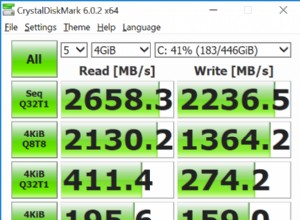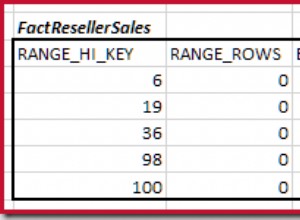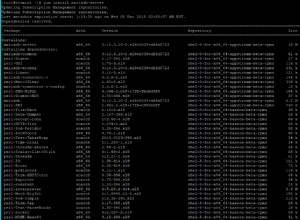Dado que los espacios están bien, debe implementar una variación de la "opción 2". Permitir espacios significa que su sincronización se puede hacer rápidamente:con sesiones en competencia simplemente verificando y avanzando en lugar de tener que esperar para ver si los demás se comprometen o revierten.
Si Oracle ofreciera un INSERT INTO..NOWAIT opción, esto sería fácil. Tal como están las cosas, probablemente involucraría a DBMS_LOCK . Esta es mi opinión sobre cómo se vería su API.
Hace algunas suposiciones sobre la identificación visible máxima que tendrías porque hiciste esas suposiciones en tu publicación original.
CREATE OR REPLACE PACKAGE foo_api AS
PROCEDURE create_foo (p_owner_id NUMBER, p_data VARCHAR2);
END foo_api;
CREATE OR REPLACE PACKAGE BODY foo_api AS
-- We need to call allocate_unique in an autonomous transaction because
-- it commits and the calling program may not want to commit at this time
FUNCTION get_lock_handle (p_owner_id NUMBER, p_visible_id NUMBER)
RETURN VARCHAR2 IS
PRAGMA AUTONOMOUS_TRANSACTION;
l_lock_handle VARCHAR2 (128);
BEGIN
DBMS_LOCK.allocate_unique (
lockname => 'INSERT_FOO_' || p_owner_id || '_' || p_visible_id,
lockhandle => l_lock_handle
);
COMMIT;
RETURN l_lock_handle;
END;
PROCEDURE create_foo (p_owner_id NUMBER, p_data VARCHAR2) IS
-- This is the highest visible ID you'd ever want.
c_max_visible_id NUMBER := 1000;
BEGIN
<<id_loop>>
FOR r_available_ids IN (SELECT a.visible_id
FROM (SELECT ROWNUM visible_id
FROM DUAL
CONNECT BY ROWNUM <= c_max_visible_id) a
LEFT JOIN foo
ON foo.owner_id = p_owner_id
AND foo.visible_id = a.visible_id
WHERE foo.visible_id IS NULL) LOOP
-- We found a gap
-- We could try to insert into it. If another session has already done so and
-- committed, we'll get an ORA-00001. If another session has already done so but not
-- yet committed, we'll wait. And waiting is bad.
-- We'd like an INSERT...NO WAIT, but Oracle doesn't provide that.
-- Since this is the official API for creating foos and we have good application
-- design to ensure that foos are not created outside this API, we'll manage
-- the concurrency ourselves.
--
-- Try to acquire a user lock on the key we're going to try an insert.
DECLARE
l_lock_handle VARCHAR2 (128);
l_lock_result NUMBER;
l_seconds_to_wait NUMBER := 21600;
BEGIN
l_lock_handle := get_lock_handle (
p_owner_id => p_owner_id,
p_visible_id => r_available_ids.visible_id
);
l_lock_result := DBMS_LOCK.request (lockhandle => l_lock_handle,
lockmode => DBMS_LOCK.x_mode,
timeout => 0, -- Do not wait
release_on_commit => TRUE);
IF l_lock_result = 1 THEN
-- 1 => Timeout -- this could happen.
-- In this case, we want to move onto the next available ID.
CONTINUE id_loop;
END IF;
IF l_lock_result = 2 THEN
-- 2 => Deadlock (this should never happen, but scream if it does).
raise_application_error (
-20001,
'A deadlock occurred while trying to acquire Foo creation lock for '
|| p_owner_id
|| '_'
|| r_available_ids.visible_id
|| '. This is a programming error.');
END IF;
IF l_lock_result = 3 THEN
-- 3 => Parameter error (this should never happen, but scream if it does).
raise_application_error (
-20001,
'A parameter error occurred while trying to acquire Foo creation lock for '
|| p_owner_id
|| '_'
|| r_available_ids.visible_id
|| '. This is a programming error.');
END IF;
IF l_lock_result = 4 THEN
-- 4 => Already own lock (this should never happen, but scream if it does).
raise_application_error (
-20001,
'Attempted to create a Foo creation lock and found lock already held by session for '
|| p_owner_id
|| '_'
|| r_available_ids.visible_id
|| '. This is a programming error.');
END IF;
IF l_lock_result = 5 THEN
-- 5 => Illegal lock handle (this should never happen, but scream if it does).
raise_application_error (
-20001,
'An illegal lock handle error occurred while trying to acquire Foo creation lock for '
|| p_owner_id
|| '_'
|| r_available_ids.visible_id
|| '. This is a programming error.');
END IF;
END;
-- If we get here, we have an exclusive lock on the owner_id / visible_id
-- combination. Attempt the insert
BEGIN
INSERT INTO foo (id,
owner_id,
visible_id,
data_)
VALUES (foo_id_seq.NEXTVAL,
p_owner_id,
r_available_ids.visible_id,
p_data);
-- If we get here, we are done.
EXIT id_loop;
EXCEPTION
WHEN DUP_VAL_ON_INDEX THEN
-- Unfortunately, if this happened, we would have waited until the competing
-- session committed or rolled back. But the only way it
-- could have happened if the competing session did not use our API to create
-- or update the foo.
-- TODO: Do something to log or alert a programmer that this has happened,
-- but don't fail.
CONTINUE id_loop;
END;
END LOOP;
END create_foo;
END foo_api;




